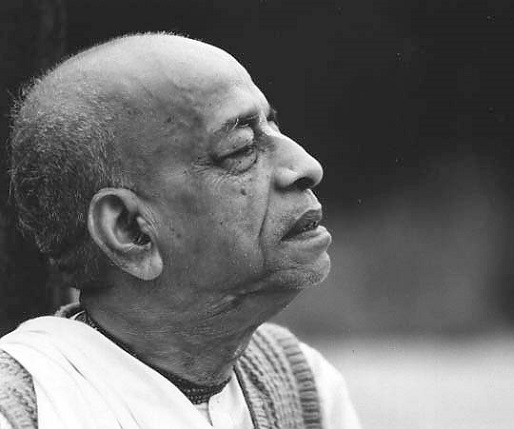Self-controlled persons who are attached to the Supreme Lord Śrī Kṛṣṇa can all of a sudden give up the world of material attachment, including the gross body and subtle mind, and go away to attain the highest perfection of the renounced order of life, by which nonviolence and renunciation are consequential.
PURPORT
Only the self-controlled can gradually be attached to the Supreme Personality of Godhead. Self-controlled means not indulging in sense enjoyment more than is necessary. And those who are not self-controlled are given over to sense enjoyment. Dry philosophical speculation is a subtle sense enjoyment of the mind. Sense enjoyment leads one to the path of darkness. Those who are self-controlled can make progress on the path of liberation from the conditional life of material existence. The Vedas, therefore, enjoin that one should not go on the path of darkness but should make a progressive march towards the path of light or liberation. Self-control is actually achieved not by artificially stopping the senses from material enjoyment, but by becoming factually attached to the Supreme Lord by engaging one's unalloyed senses in the transcendental service of the Lord. The senses cannot be forcibly curbed, but they can be given proper engagement. Purified senses, therefore, are always engaged in the transcendental service of the Lord. This perfectional stage of sense engagement is called bhakti-yoga. So those who are attached to the means of bhakti-yoga are factually self-controlled and can all of a sudden give up their homely or bodily attachment for the service of the Lord. This is called the paramahaṁsa stage. Haṁsas, or swans, accept only milk out of a mixture of milk and water. Similarly, those who accept the service of the Lord instead of māyā's service are called the paramahaṁsas. They are naturally qualified with all the good attributes, such as pridelessness, freedom from vanity, nonviolence, tolerance, simplicity, respectability, worship, devotion and sincerity. All these godly qualities exist in the devotee of the Lord spontaneously. Such paramahaṁsas, who are completely given up to the service of the Lord, are very rare. They are very rare even amongst the liberated souls. Real nonviolence means freedom from envy. In this world everyone is envious of his fellow being. But a perfect paramahaṁsa, being completely given up to the service of the Lord, is perfectly nonenvious. He loves every living being in relation with the Supreme Lord. Real renunciation means perfect dependence on God. Every living being is dependent on someone else because he is so made. Actually everyone is dependent on the mercy of the Supreme Lord, but when one forgets his relation with the Lord, he becomes dependent on the conditions of material nature. Renunciation means renouncing ones dependence on the conditions of material nature and thus becoming completely dependent on the mercy of the Lord. Real independence means complete faith in the mercy of the Lord without dependence on the conditions of matter. This paramahaṁsa stage is the highest perfectional stage in bhakti-yoga, the process of devotional service to the Supreme Lord.
(Śrīmad-Bhāgavatam 1.18.22, Translation and Purport)
.

